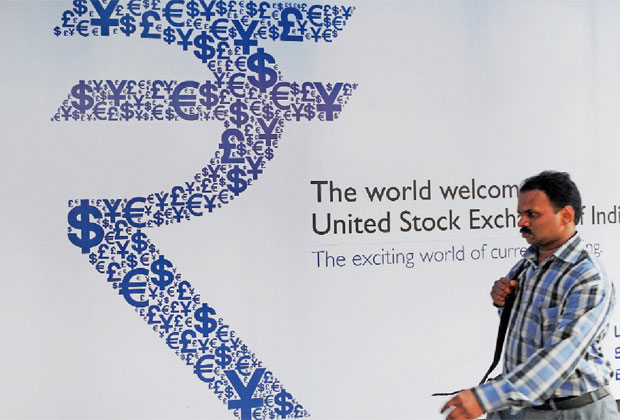
New Delhi, May 17: The Indian rupee plummeted to an all time low on Wednesday to 54.46 rupees to the dollar, or up to Rs14.81 to the dirham, breaching its previous record low of 54.39 struck on December 15.
Local money exchanges witnessed “higher than normal footfalls” as non residents rushed to remit money as the rupee’s value against the dollar-pegged UAE currency declined to over 20 per cent during the past 12 months.
The Reserve Bank of India said it was closely observing the rupee’s movement and will act if needed.
Although the immediate trigger for the rupee plunge was a sudden surge in demand for dollar amid deepening uncertainty over the eurozone debt crisis, analysts blamed it on India’s deteriorating macro-economic conditions, most importantly its twin financial setbacks — current account defcit and the fiscal deficit that are among the highest among emerging Asian economies.
“In the backdrop of the Greek crisis, fiscal deficit and policy paralysis, the currency looks weaker, and could remain so for few days to come, if not more,” said Y. Sudhir Kumar Shetty, chief operating officer, Global Operations, UAE Exchange. Remittances, especially big-ticket transactions, where people send money for investments or savings, are on the rise, which is a natural outcome of currency weakening, said Shetty.
“But blue collar remittances, which are usually sent for family maintenance, maintain a steady level irrespective of the currency movements, which is discernible now. Reserve Bank of India hasn’t taken any significant corrective measures, which indicates that the currency could weaken further,” he said.
Sajith Kumar P K, director and CEO of JRG International Brokerage, said the chances are high that the rupee touch 57 to 58 levels to the dollar in the medium- to long-term basis if the prevailing situation continues. Next support levels are 55.80, 57.80 and resistance levels are 54.40, 52.20.
Kumar said urgent action from policy makers are needed at this juncture to stop a further steep fall of the currency.
“While more steps are needed to restore the confidence level of foreign institutional investors, policy makers should initiate more avenues for foreign direct investments to strengthen the rupee,” he said.
Some analysts suggest that it was time that the rupee is allowed to depreciate and left to find its own level that could slow imports and help raise exports.
“The pressure on the rupee has been mostly due to inadequate dollar supplies to meet India’s rising import bill. About 20 per cent of it is to fund its crude oil imports. India’s weak fundamentals, aggravated by imprudent subsidies, are getting increasingly exposed at a time when unfriendly tax proposals keep at bay foreign investors,” one analyst said.
India government’s lack of determination to push ahead with policy reforms had been a further deterrent to foreign investments into the country, analysts said. “The need of the hour are sound fundamentals to attract capital inflows that are needed to fund the current-account shortfall,” they said.
Foreign portfolio investors have started going slow on investments into the country. In April, they pulled out close to $1 billion from the Indian markets. On the other hand, the country’s import bill has risen due to high crude and commodity prices amid a slower growth in exports.
According to ING Vysya Bank Ltd, India’s economic fundamentals are pressuring the currency more than global factors. The trade deficit swelled to a record $184.9 billion in the year ended March 31 and industrial output shrank 3.5 per cent in March from a year earlier, government figures showed this month. Standard & Poor’s cut the outlook on the nation’s BBB- sovereign debt rating to negative on April 25.





Comments
Add new comment